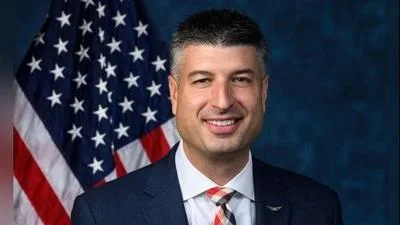Interim President Teresa K. Woodruff, Ph.D. | Michigan State University
Interim President Teresa K. Woodruff, Ph.D. | Michigan State University
For the third consecutive year, Michigan State University (MSU) and the Michigan Department of Natural Resources (DNR) collaborated to band peregrine falcon chicks. This effort aims to monitor their movements and support the species' recovery.
This year's banding event marks a significant milestone as it is likely the last between MSU and DNR due to the project's success. The peregrine falcon's status has improved from state endangered to state threatened.
The MSU Fisheries and Wildlife Club initiated efforts in 2022 by securing a nest box atop Spartan Stadium. This encouraged reproduction, resulting in three chicks being banded this year: Reggie, Acorn, and Franklin. Over three years, ten chicks have been banded at this location, one of 30 nesting sites across Michigan.
Jim Schneider from MSU's Department of Fisheries and Wildlife explained that peregrines have frequented campus since the early 2000s. Although previous nest boxes went unused, birds preferred Spartan Stadium's south end. "Eventually we just started 'listening' to the birds," Schneider said.
The recent banding took place on June 3 inside Spartan Stadium with participation from MSU and DNR staff, along with students from the Fisheries and Wildlife Club. Researchers carefully removed chicks from their nest for banding while ensuring safety due to potential defensive behavior from adult falcons.
Will Herbert of MSU emphasized community involvement in the project: “Peregrine falcons are an endangered species in Michigan... The banding is a sort of sending away party for the falcons before they are developed enough to leave the nest.”
Past years' chicks like Swooper and Pickles have found new homes after relocation or injury recovery. More details about these clutches can be found through MSU's timelines.
Falcon banding began when peregrines were reintroduced in Michigan between 1986-1992. Chad Fedewa of DNR noted that efforts since then led to successful population recovery despite challenges like pesticide use affecting reproduction until bans were implemented in the 1970s.
While this may be the final planned banding at Spartan Stadium with DNR, future initiatives are considered with Jennifer Owen of MSU working on permits for continued efforts.
Fedewa remarked on urban adaptation: “Part of the recovery effort was introducing peregrines to urban areas... They have adapted well to urban environments.”
Updates on MSU's falcon chicks will be available online, continuing support for conservation success stories like those seen at Spartan Stadium.





 Alerts Sign-up
Alerts Sign-up